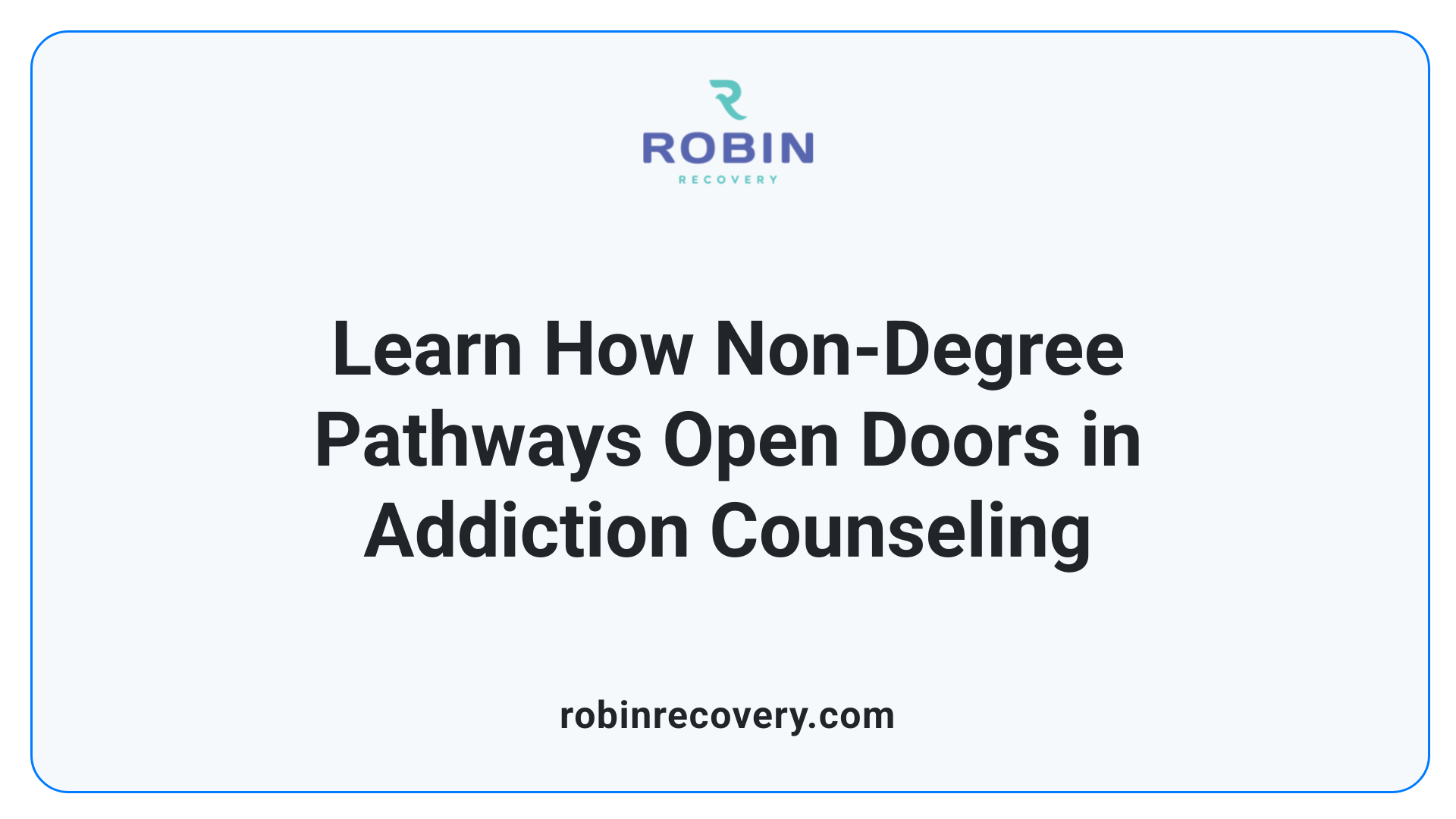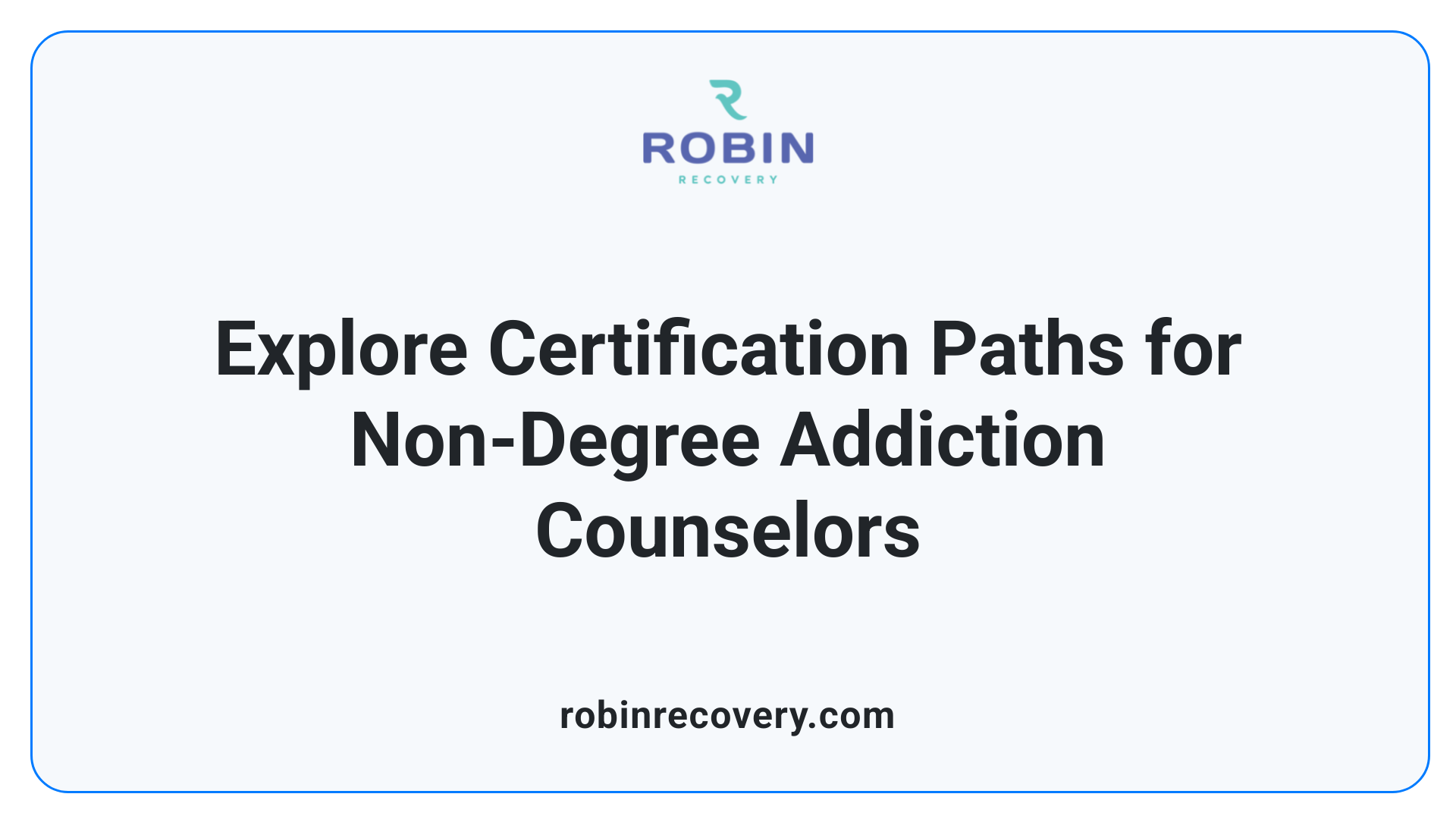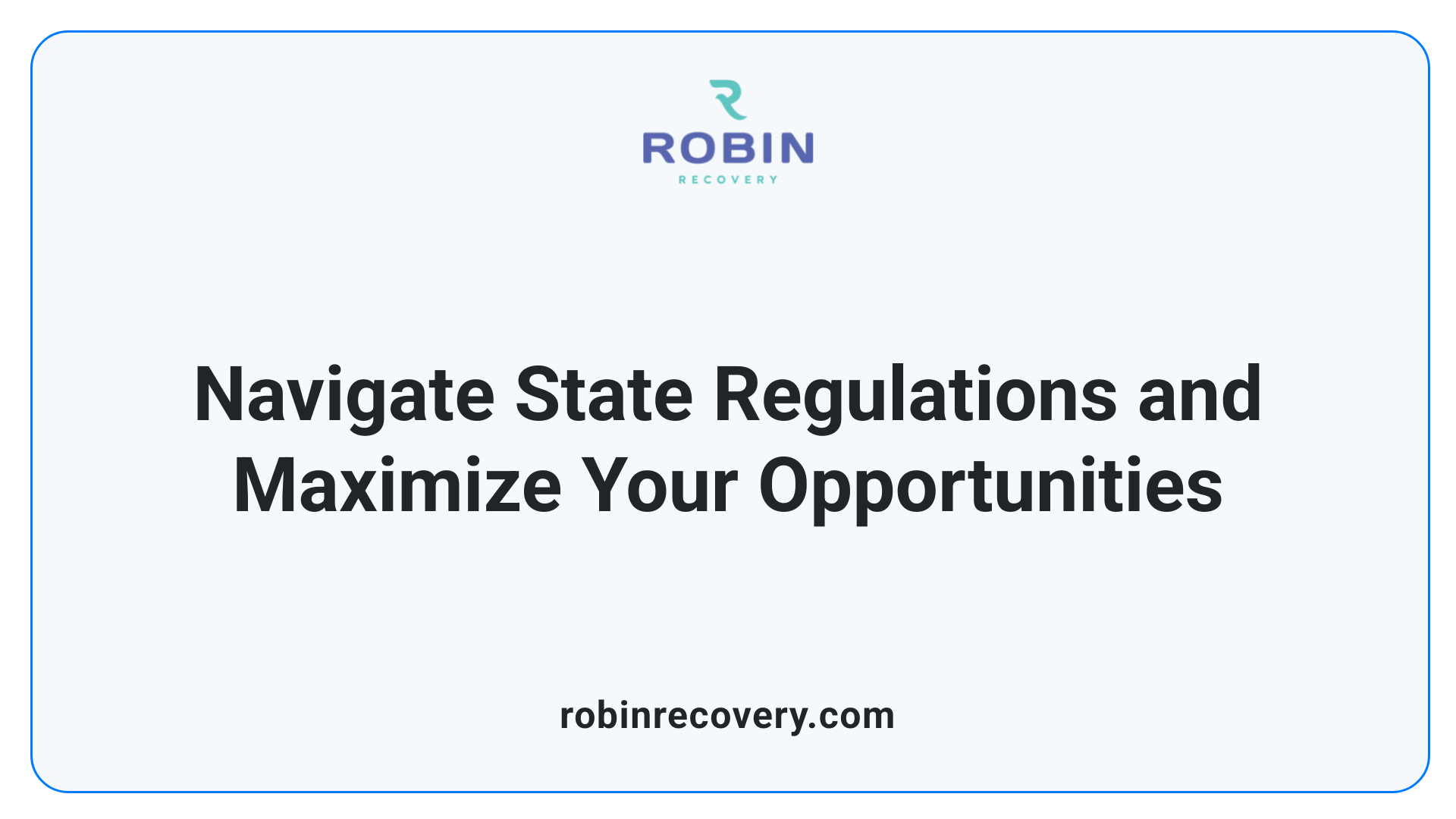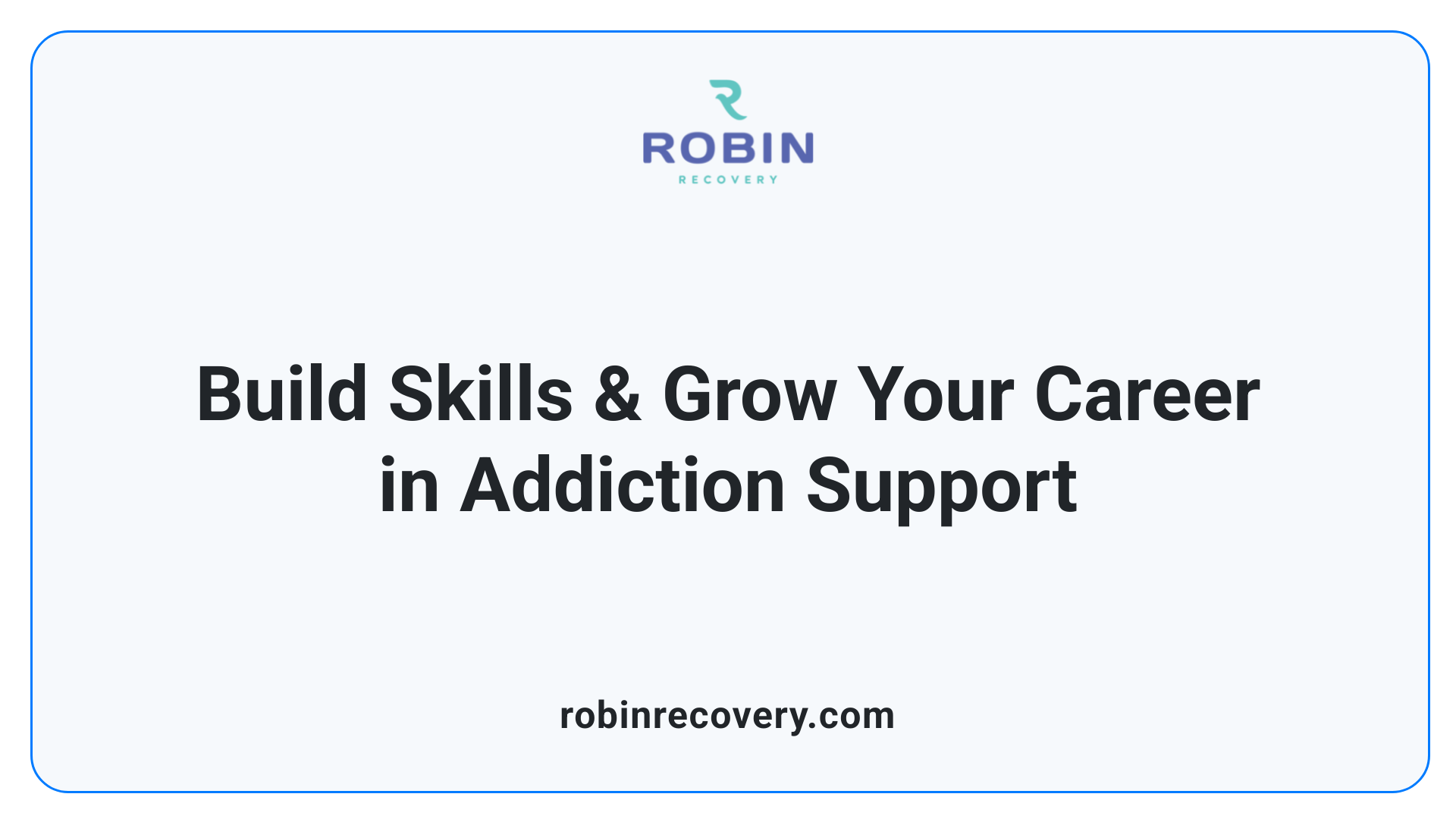How to Become an Addiction Counselor Without a Degree

Breaking Barriers: Entering Addiction Counseling Without a Traditional Degree
While many traditional pathways into addiction counseling require a bachelor’s or master’s degree, numerous alternative routes are available for those without formal college education. This article explores various strategies, certifications, and practical steps you can take to become a competent and impactful addiction counselor, emphasizing experiential learning, certifications, and state-specific options.
Understanding the Landscape of Non-Degree Addiction Counseling

Is it possible to be an addiction counselor without a degree?
Yes, becoming an addiction counselor without a traditional degree is feasible through various pathways. Many individuals enter the field by obtaining certifications such as the Peer Support Specialist, Substance Abuse Counselor Certification, or Mental Health First Aid. These programs focus on practical skills and can often be completed in a few months.
Hands-on experience is also vital. Roles like peer support workers, community health workers, or substance use disorder (SUD) technicians provide valuable exposure and skills. Volunteer work in organizations such as crisis hotlines, community centers, or recovery programs offers additional practical experience.
While such roles help in building foundational skills like active listening, empathy, and effective communication—crucial for counseling—progressing to higher levels or licensed positions generally requires further education, including a bachelor’s or master’s degree, supervised clinical hours, and passing licensure exams.
In essence, entering the field without a degree offers flexibility and a faster start, but career advancement and salary potential are often enhanced with additional formal education. Overall, motivated individuals can make significant contributions to the field, especially with ongoing education and skill development.
Getting Certified as a Non-Degree Addiction Counselor

What certification options and requirements are available for those without a degree?
For individuals without a college degree, there are various certification pathways in addiction counseling, often tailored to different states' regulations and specific fields. Many programs accept candidates with a high school diploma or GED, provided they complete relevant training and supervised practice.
One popular certification is the Certified Recovery Support Specialist (CRSS), which requires only a high school diploma or equivalent, along with 75 hours of specialized training, 1,000 hours of supervised work experience, and passing a certification exam.
Additionally, Certified Addiction Counselor (CAC) credentials can be accessible for non-degree holders, often requiring up to 6,000 hours of supervised work experience and relevant training hours. In some states, roles such as peer recovery specialists or SUD technicians are open to applicants without a degree, especially when coupled with short-term certification programs.
Overall, most state-level licenses and certifications for substance use disorder (SUD) support positions are designed to include individuals with minimal formal education but with appropriate training and practical experience.
What steps are involved in obtaining addiction counseling certification without a degree?
The process to become a certified addiction counselor without a degree generally involves several sequential steps:
- Complete a specialized training program: These programs are often available online, affordable, and can be completed in about six months. They focus on addiction psychology, ethics, confidentiality, and cultural competence.
- Accumulate supervised work experience: Most certification standards require between 500 and 2,000 hours of hands-on practice. Candidates may work as peer recovery specialists, SUD technicians, or volunteer in related organizations.
- Pass a certification exam: Successful completion of a standardized exam, such as the IC&RC Peer Recovery Exam, demonstrates knowledge of core principles, ethics, advocacy, and recovery support.
- Apply for certification: Once training, experience, and exam requirements are met, candidates submit their application to the appropriate certifying body or state agency.
Throughout this process, maintaining documentation and fulfilling any additional state-specific requirements are essential. This pathway provides a practical route into the field without the need for a college degree.
Are there specific training programs for non-degree candidates, and what do they entail?
Yes, several targeted training programs cater specifically to individuals without a college degree. These programs vary in length but generally aim to prepare candidates for certification and entry-level roles in addiction counseling.
Many programs are fully online for ease and flexibility. For example, the Sober College program—approved by organizations such as NAADAC and IC&RC—can be completed in about six months. These programs typically cover topics such as ethics, addiction psychology, confidentiality, cultural competence, and counseling techniques.
The curriculum often includes practical components like role-playing, case study analysis, and supervised internships to foster real-world skills. Some programs also offer modular courses, allowing participants to progress at their own pace.
Successfully completing these programs provides the foundational knowledge needed for certification exams and entry into the counseling workforce. They serve as excellent stepping stones for those who want to help others recover from substance use issues.
What is the typical process for gaining supervised work experience for non-degree counselors?
Supervised work experience is a cornerstone of certification for non-degree addiction counselors. Candidates typically need to document between 500 and 2,000 hours of work, depending on state regulations and certification tiers.
Opportunities to gain this experience include roles such as peer recovery specialists, SUD technicians, community health workers, or volunteer positions in crisis hotlines, recovery centers, hospitals, and community agencies.
Many training programs incorporate structured practicum or internship components. These practical experiences are supervised by licensed professionals and aim to develop essential skills like counseling techniques, crisis intervention, and client engagement.
Volunteer work-related to substance use recovery can also contribute to supervised hours, provided it is documented and meets state criteria.
Maintaining detailed records of practice hours and supervision ensures candidates meet the requirements for certification. Gaining this hands-on experience not only prepares applicants for certification exams but also helps build confidence and competence in delivering recovery support.
State-Specific Regulations and Opportunities

Do licensing and regulatory requirements exist for addiction counselors without a degree?
Many states have established licensing and certification pathways for addiction counselors who do not possess a college degree. These pathways often target roles such as substance use disorder (SUD) technicians, peer recovery specialists, and recovery coaches.
In these state-regulated roles, candidates are typically required to complete specialized training hours, which can range from 12 to 300 hours, depending on the specific position. They must also pass standardized exams, such as the IC&RC Peer Recovery Exam or similar assessments focused on ethics, advocacy, and recovery support.
However, for higher-level or fully licensed professional roles, most states set minimum educational requirements typically involving at least a high school diploma, GED, or some post-secondary education. Some states, like Alaska and Nebraska, go further by allowing individuals without a formal degree to attain licenses for independent practice based on experience and specific training hours.
Overall, the landscape of regulation varies widely, with some states offering flexible pathways for non-degree holders, while others impose stricter educational prerequisites.
How do state regulations influence pathways for non-degree addiction counselors?
State regulations shape the opportunities and career trajectories for individuals aspiring to work as addiction counselors without a college degree through clearly defined requirements. These statutes determine what training, supervised hours, and exams are necessary for certification and licensure.
In Florida, for instance, the Certified Recovery Support Specialist (CRSS) credential can be earned with just a high school diploma or GED coupled with about 75 hours of training and 1,000 hours of supervised work.
In contrast, states like Alaska and Nebraska allow individuals to qualify for independent practice licenses based primarily on practical experience and additional training hours, with minimal educational prerequisites. This model encourages motivated non-degree holders to pursue licensure through experiential learning and targeted certification.
States with more stringent regulations, which often require a bachelor’s or higher degree, limit non-degree pathways but still provide options for entry-level roles. These regulations incentivize ongoing education but can pose barriers for those without formal post-secondary education.
What resources help non-degree candidates navigate state licensing procedures?
To assist non-degree candidates in navigating licensing and certification processes, numerous resources are available:
- State health department websites: These official portals outline specific requirements, application procedures, approved training providers, and exam details.
- Professional associations: Organizations such as the National Association of Addiction Counselors (NAADAC) and the International Certification & Reciprocity Consortium (IC&RC) offer guidance, training resources, and directories of approved programs.
- Online training modules: Many states and organizations provide online courses that fulfill training hour requirements, often at low or no cost.
- Webinars and informational sessions: These educational events are designed to clarify licensing steps, exam preparations, and ongoing requirements.
- Local and regional advocacy groups: These groups often facilitate mentorship programs, share updates on policy changes, and enhance networking opportunities.
- Consultation with licensed professionals: Connecting with licensed counselors can yield practical insights, mentorship, and guidance tailored to specific state requirements.
Leveraging these resources can streamline the licensing process, bridge knowledge gaps, and foster successful careers without a college degree.
Are independent practice opportunities available for non-degree addiction counselors in certain states?
Yes, some states offer pathways for non-degree addiction counselors to attain independent practice licenses. Alaska and Nebraska exemplify jurisdictions where individuals can become fully licensed to operate independently based on specialized training, practical experience, and demonstrated competency.
These states recognize that extensive supervised practice hours—often between 500 and 2000 hours—combined with passing standardized exams, can suffice for licensure without a college degree. Successfully obtaining these licenses allows practitioners to provide counseling services autonomously, expand their scope of work, and attain higher earnings.
However, maintaining such licensure requires ongoing education and adherence to state regulations.
This model encourages motivated individuals to develop their skills through targeted training and experiential learning, offering a viable route into professional practice for non-degree holders.
Aspect Details Additional Notes Roles SUD technician, Peer Recovery Specialist, Recovery Coach Entry-level positions with supervised practice hours Training Hours 12-300 hours depending on role Covers ethics, addiction psychology, confidentiality Practice Hours 500-2000 hours Variable by state, essential for licensure Certification Exams IC&RC Peer Recovery Exam, others Focus on advocacy, ethics, mentoring Independent Practice Permitted in Alaska, Nebraska Licenses based on experience, training Educational Requirements High school diploma or GED Some states accept no formal education Resources State health agencies, NAADAC, IC&RC For guidance, training, and certification
This overview highlights the diverse options available across states for non-degree addiction counselors and underscores the importance of local regulations in shaping career pathways.
Practical Strategies for Success and Career Growth

What skills are essential for becoming a substance abuse counselor without a formal degree?
Transitioning into addiction counseling without a traditional college degree requires a set of core competencies. The most important skills include active listening, empathetic communication, emotional resilience, and cultural sensitivity. These abilities help build trust and rapport with clients, which is fundamental in recovery work.
Having a genuine desire to support others, along with compassion and nonjudgmental attitudes, enhances effectiveness. Personal qualities like resourcefulness and the drive to help individuals overcome substance use challenges are critical. While formal educational requirements vary by state, many entry-level roles are accessible through certifications or training programs in addiction studies. Gaining practical experience through internships or volunteer positions often provides the hands-on skills necessary to succeed in this expanding field.
How can non-degree counselors advance their careers and skills?
Advancement for those without a degree hinges largely on continuous learning and acquiring specialized credentials. Enrolling in advanced training courses, attending industry conferences, and participating in professional development programs are crucial steps.
Joining organizations such as the National Association of Addiction Counselors (NAADAC) provides opportunities for networking, mentorship, and staying current with industry best practices. Developing expertise in niche areas like trauma-informed care, motivational interviewing, or case management can lead to higher roles and increased earning potential.
Gaining additional certifications, such as Certified Alcohol and Drug Counselor (CADC) or Certified Recovery Support Specialist (CRSS), often involves completing required coursework, supervised hours, and passing certification exams. These credentials can open pathways to supervisory positions or specialization.
What role does mentorship and professional involvement play in the success of non-degree counselors?
Mentorship and active participation in professional communities are vital for career development. Mentors offer guidance, support, and industry insights that help aspiring counselors navigate certification processes and develop practical skills.
Engaging in conferences, workshops, and networking events fosters peer learning and exposes professionals to emerging practices and regulations. Membership in organizations like NAADAC or IC&RC can facilitate mentorship opportunities, referrals, and collaborative projects.
Such involvement enhances credibility, boosts confidence, and keeps counselors informed about industry trends. Consistent professional engagement helps build a reputation and creates opportunities for career advancement, leadership roles, or new specializations.
Are there specialized fields within addiction counseling suitable for non-degree professionals?
Absolutely. Many specialized fields within addiction support are accessible to non-degree holders. Roles such as peer recovery specialists, crisis counselors, community health workers, and addiction support advocates focus on peer support, outreach, education, and short-term interventions.
Specializations like trauma-informed care, motivational interviewing, and cultural competence enable non-degree professionals to serve specific populations effectively. Certifications and continuous education enhance expertise, making these practitioners valuable components of addiction treatment teams.
Many of these positions require brief certification programs or on-the-job training, making them highly accessible. These specialties allow professionals to develop niches within the broader addiction counseling field, offering opportunities for personal growth and increased responsibility.
What strategies facilitate a successful transition into higher-level roles or licensed practice?
For non-degree professionals aiming to move into higher or licensed roles, a strategic approach involves ongoing education, certifications, and skill building. Pursuing additional credentials such as the CADC or CRSS—requiring specified training hours and supervised experience—is essential.
Gaining diverse practical experience across different settings like outpatient clinics, hospitals, or community programs broadens competency and demonstrates readiness for advanced roles.
Networking plays a crucial role; connecting with industry leaders and joining professional associations like NAADAC or IC&RC can lead to mentorship opportunities and access to leadership positions.
Participation in continuous learning activities—webinars, workshops, and conferences—helps stay updated on best practices and regulatory changes. Demonstrating professional reliability, ethical conduct, and commitment to ongoing development increases promotion prospects.
By strategically combining credentialing, experience, and professional engagement, counselors can advance toward licensed practice, supervisory roles, or specialization in niche fields, ensuring sustained career growth and contribution to addiction recovery efforts.
Charting Your Course in Addiction Counseling Without a Degree
Entering addiction counseling without a traditional college degree is not only feasible but also rewarding with the right approach. By gaining practical experience, pursuing targeted certifications, leveraging state-specific regulations, and actively engaging in professional communities, motivated individuals can build meaningful careers in this vital field. While advanced roles and licensure often require additional education, starting from non-degree roles provides a solid foundation and a pathway to growth. With dedication, continual learning, and strategic networking, aspiring addiction counselors can develop the skills, credibility, and credentials necessary to make a lasting impact—helping others heal while forging a fulfilling career.
References
- How to Become an Addiction Counselor Without a Degree?
- How to Become a Substance Abuse Counselor Without a Degree
- Earn Counseling Certification Without A Degree - Sober College
- How To Become A Counselor / Therapist Without A Degree - Tallo
- How To Become A Substance Use Counselor | National University
- Become a Substance Abuse Counselor Florida | CAC, CAP & CRSS ...
- How To Become a Counselor Without a Degree: 6 Steps - Learn.org
- Minimum Degree Requirements to Become a Substance Abuse ...
